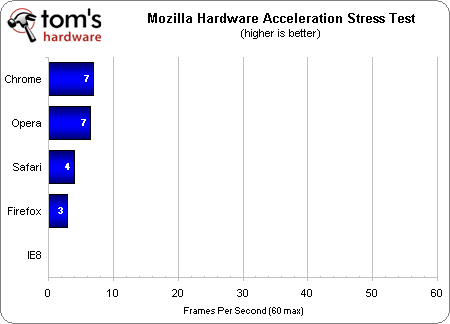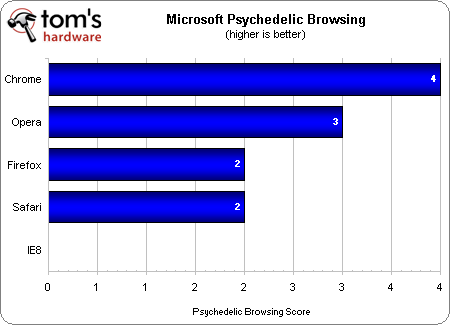Web Browser Grand Prix: Chrome 18, Firefox 11, Windows XP
Over the past two years, we've tested the top five Web browsers using modern PC hardware. But today, going against all that is sacred to the enthusiast crowd, we're breaking out an old beige box to bring you Web Browser Grand Prix: Windows XP Edition!
Get Tom's Hardware's best news and in-depth reviews, straight to your inbox.
You are now subscribed
Your newsletter sign-up was successful
Hardware Acceleration And WebGL
| HTML5 Hardware Acceleration |
Mozilla Hardware Acceleration Stress Test
Chrome and Opera tie for first place in Mozilla's Hardware Acceleration Stress Test, both with seven frames per second. Safari places second at four FPS, followed by Firefox in third place. Predictably, IE8 is unable to run this benchmark.
Microsoft Psychedelic Browsing
Chrome and Opera again take the lead with scores of four and three (respectively). Firefox and Safari tie for third place, both earning two points. IE8 could not run this benchmark.
| WebGL |
There is not much to say about WebGL on this old XP-based machine. Chrome is the only browser capable of running WebGL content on our decade-old test system, and performance alternates between bad and terrible.
Get Tom's Hardware's best news and in-depth reviews, straight to your inbox.
Current page: Hardware Acceleration And WebGL
Prev Page HTML5 Performance Benchmarks Next Page Memory Efficiency Benchmarks-
wheredahoodat "Both Opera and Chrome feltmuch smoother on our old PC than Firefox"Reply
I do kinda feel the difference with Firefox's responsive going from my main modern desktop to my older labtop that has regulated to a makeshift HTC. I believe Firefox XUL interface is the culprit; it was a big enough problem for Firefox mobile to abandon it in favor of native Android GUI, but who knows at this point. I guess might actually give Opera a chance. -
agnickolov How come only a single reader requested numerical composite scoring, that's the most logical way of scoring after all! With that said, I'd have liked if you didn't use the rankings but the raw scores after a more intelligent transformation as the input for weighted averaging...Reply
For example, for each category you could subtract the lowest-placed score from all scores and then normalize in the range by dividing all adjusted scores by the topmost adjusted score. This way the top perfomer always has 1 and the worst performer always has 0 modified score (you'd need to invert them for tests where lower is better of course, e.g. subtract these from 1). Then apply your ranks to these scores and you get the composite score. It's not a perfect transformation, but it certainly has more fairly distributed weight (pun intended) than what you have used here. -
aznjoka Thats my Opera, for those who have never tried Opera. It's an amazing piece of software, it does the job, and it does it better then most.Reply -
confish21 Interesting move to make this article. Well done! Don't waste your time on a vista run though... Im so close my release date. xDReply -
csbeer aznjokaThats my Opera, for those who have never tried Opera. It's an amazing piece of software, it does the job, and it does it better then most.Reply
XP can't run 9. Need to upgrade OS in order to get higher IE. -
mayankleoboy1 excellent review!Reply
some points:
1.A lot of corporates still use IE7. maybe you should include that too in your benchmarks
2.if you remove HTML5 (with and without H/W acceleration), i think Opera's victory margin will be quite huge.
3.Regarding smoothness, i beleive FF is quite poor in this. But the developers know about it and are very activle working on it. I thik FF13 will be the release when smoothness will improve. look at "Firefox Snappy".
4. i would like to have a subjective recommendation at the end of the article, something you subjectively felt was the best amongst all the browsers, even though it may be trailing in numbers. -
mayankleoboy1 Why did you use the AGP? I bet 99.99% of those Pentium4 era computers use the onboard Intel IGP.Reply
Also that would definitely disable the H/W acceleration of browsers.

